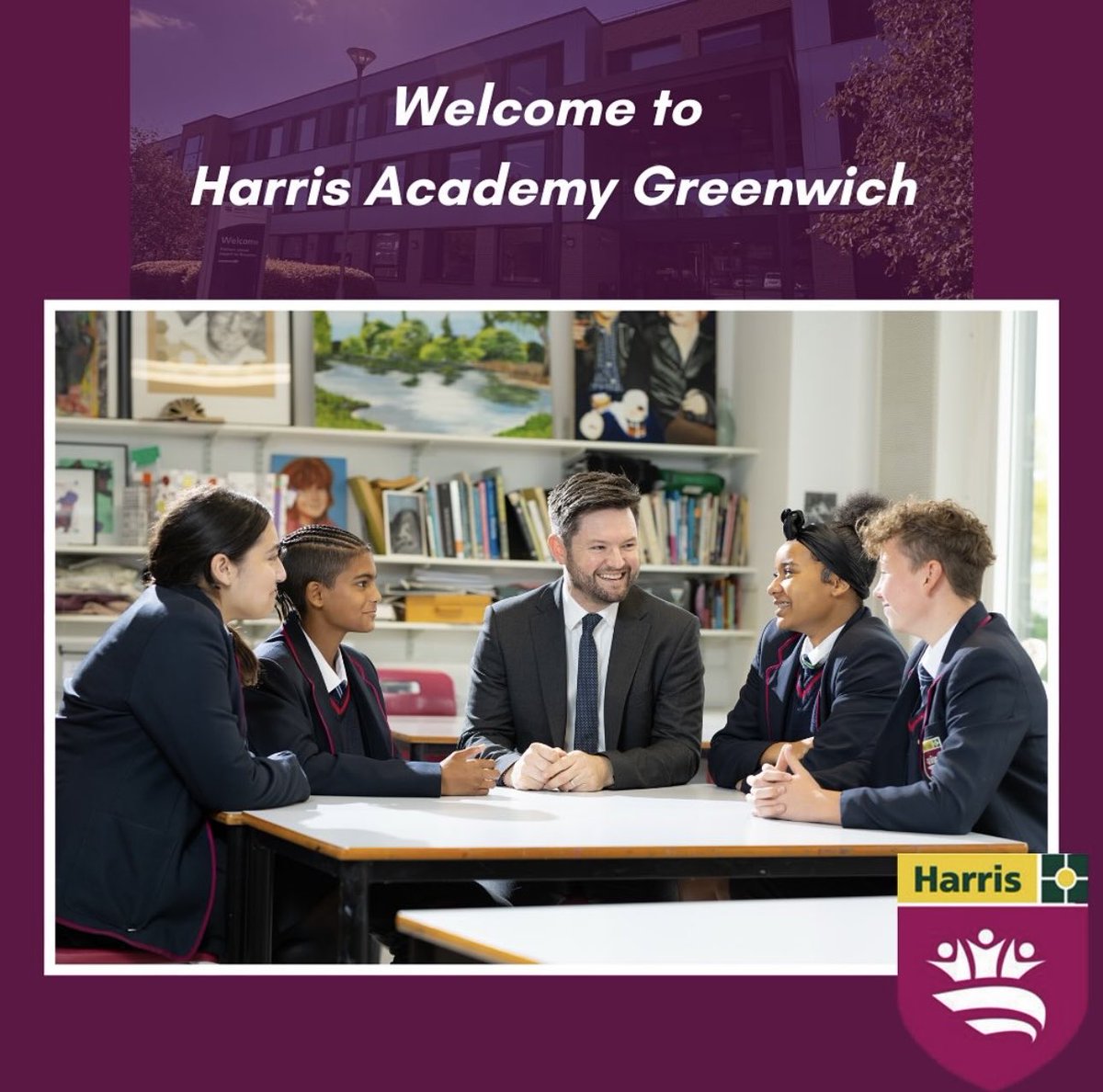Pupil Premium Spend
Pupil premium strategy statement 2025-2026
This statement details our school’s use of pupil premium (and recovery premium for the 2023 to 2024 academic year) funding to help improve the attainment of our disadvantaged pupils.
It outlines our pupil premium strategy, how we intend to spend the funding in this academic year and the effect that last year’s spending of pupil premium had within our school.
School overview
|
Detail |
Data |
|
School name |
Harris Academy Greenwich |
|
Number of pupils in school |
1158 (926 in year 7-11) |
|
Proportion (%) of pupil premium eligible pupils |
30.3% (of year 7-11) |
|
Academic year/years that our current pupil premium strategy plan covers |
2023 – 2024 2024 – 2025 2025 - 2026 |
|
Date this statement was published |
September 2025 |
|
Date on which it will be reviewed |
January 2026 |
|
Statement authorised by |
Jack Docherty Principal |
|
Pupil premium lead |
Daniel Sofianos Vice Principal |
|
Governor / Trustee lead |
Julia Dodds |
Funding overview
|
Detail |
Amount |
|
Pupil premium funding allocation this academic year |
£331,634 |
|
Academic year/years that our current pupil premium strategy plan covers |
2023/2026 |
|
Date this statement was published |
September 2025 |
|
Date on which it will be reviewed |
July 2026 |
|
Pupil premium funding carried forward from previous years (enter £0 if not applicable) |
£0 |
|
Total budget for this academic year If your school is an academy in a trust that pools this funding, state the amount available to your school this academic year |
£331,634 |
Part A: Pupil premium strategy plan
Statement of intent
|
Our Pupil Premium strategy is designed to eliminate barriers to learning and accelerate progress for disadvantaged pupils. We aim to ensure that every pupil, regardless of background, achieves highly and thrives both academically and personally. Our objectives are clear:
Knowledge is Power – and we make it stick. Our ambition is that all pupils access a rich, challenging curriculum built on the best that has been thought and said in each discipline. Through our vision – Work Hard, Be Kind, Take Responsibility – we develop character, resilience, and confidence, enabling pupils to succeed in school and beyond. We expect impeccable behaviour and focused attention from all students. To achieve this, our strategy prioritises:
Our whole-school priorities underpin this plan: Behaviour and Attendance | Teaching | Curriculum | Personal Development | Staff Training Every action we take aligns with these priorities to guarantee a fair, ambitious education for all, with particular impact for disadvantaged pupils. In 2025–26, our focus is on maximising academic outcomes through the highest-leverage strategies inside and outside the classroom, ensuring gaps for disadvantaged pupils are identified and addressed earlier, and successes celebrated sooner. High-quality teaching remains at the heart of our approach, benefiting all pupils while accelerating progress for those who need it most. Finally, our diagnostic approach ensures interventions are personalised and reviewed termly, keeping support tightly aligned to the needs of disadvantaged pupils and enabling sustained improvement. |
Challenges
This details the key challenges to achievement that we have identified among our disadvantaged pupils.
|
Challenge number |
Detail of challenge |
|
1 |
Developing learning behaviours to reduce behaviour incidents including detentions and suspensions. PP students are over-represented in suspensions and supervised study (part of our internal behaviour system).
|
|
2 |
Learning gaps persist because of historical reasons but also because we know that disadvantaged children are highly likely to leave primary school behind their peers. Our assessments, observations and discussions with pupils and families have identified social and emotional issues for many pupils, such as anxiety and low self-esteem. This is partly driven by concern about catching up lost learning and exams/future prospects, and the lack of enrichment opportunities due to the pandemic. These challenges particularly affect disadvantaged pupils, including their attainment. |
|
3 |
Improve academic behaviours such as homework, revision and reading. Assessments, observations and discussion with KS3 pupils indicate that disadvantaged pupils generally have lower levels of reading comprehension than peers. This impacts their progress in all subjects. Too many students lack fluency in literacy. |
|
4 |
Improve attendance and punctuality Our attendance data over the last year indicates that
|
|
The implementation of the curriculum to ensure that all students learn it as we intend; ensure all teachers are upskilled and equipped with strategies that check all students (especially PP) have access to the curriculum. |
Intended outcomes
This explains the outcomes we are aiming for by the end of our current strategy plan, and how we will measure whether they have been achieved. We will introduce midpoint milestone indicators for each intended outcome to ensure early identification of success or slippage, enabling rapid intervention. These will be reviewed termly by SLT and governors.
|
Success criteria |
|
|
Improved reading ages and comprehension among disadvantaged pupils. |
Reading comprehension tests demonstrate improved comprehension skills among disadvantaged pupils and a smaller disparity between the scores of disadvantaged pupils and their non-disadvantaged peers. |
|
Improved attainment among disadvantaged pupils across the curriculum at the end of KS4, with a focus on students that achieve standard and strong passes in English and maths |
2025/26 KS4 outcomes:
|
|
Improved engagement and completion of homework. Self-regulatory skills among disadvantaged pupils across all subjects to ensure they engage in a scholarly culture |
The percentage of completed homework is higher, and incomplete homework detentions are reduced. Teacher reports, behaviour data and class observations suggest disadvantaged pupils are more able to monitor and regulate their own learning. This finding is supported by homework completion rates across all classes and subjects. |
|
To achieve and sustain improved attendance for all pupils, particularly our disadvantaged pupils. |
Sustained high attendance from 2025/26 demonstrated by:
|
|
Improvement in behaviour of students |
|
|
Improved teaching and learning for teachers and students |
|
Activity in this academic year plan
This details how we intend to spend our pupil premium (and recovery premium funding) this academic year to address the challenges listed above.
Teaching (for example, CPD, recruitment and retention)
Quality of teaching for all
Budgeted cost: £129,620
|
Activity |
Evidence that supports this approach |
Challenge number(s) addressed |
|
Use of instructional coaching to enhance the feedback provided to staff to improve their teaching in their classroom |
Instructional coaching is the best tool educators have in improving teaching quality. The one-to-one conversation focuses on the enhancement of learning and development through increasing self-awareness and a sense of personal responsibility, where the coach facilitates the self-directed learning of the coachee through questioning, active listening, and appropriate challenge in a supportive and encouraging climate. |
5 |
|
CPD for teaching and learning |
We will ensure that CPD sessions include explicit modelling of how strategies benefit disadvantaged learners, supported by instructional coaching feedback cycles that reference PP students directly within coaching goals.
Whole school and individual CPD can help teachers obtain new teaching techniques, share best practice, and apply fresh approaches to teaching that allows them to improve their ability both for students, as well as expand their own personal opportunity within the teaching industry.
All teaching-related spending will be evaluated using a combination of learning walks, work scrutiny focusing on PP pupils, and PP student voice panels held termly |
5 |
|
Additional EAL support to improve the learning gap to ensure those students for whom English is a second language are supported in accessing the curriculum and succeeding in school. |
Effective differentiation enables all learners to access the curriculum. For EAL learners the key to accessing the curriculum lies in differentiation techniques and strategies that focus on facilitating and checking understanding. All pupils need to understand and be able to use the language of the curriculum in order to achieve at or above age expectations
|
3, 5 |
|
Improving literacy in all subject areas in line with recommendations in the EEF Improving Literacy in Secondary Schools guidance. Deliver an effective literacy catchup strategy (including oracy and reading) because too many students lack fluency in literacy and cultural capital. We will fund professional development for staff and create time for them to adopt new strategies |
Acquiring disciplinary literacy is key for students as they learn new, more complex concepts in each subject: Improving Literacy in Secondary Schools Reading comprehension, vocabulary and other literacy skills are heavily linked with attainment in maths and English:
|
3 |
|
Developing metacognitive and self-regulation skills in all pupils. To promote our scholarly culture and making it stick agenda, students are taught how to revise effectively through as part of our scholars programme in KS4 and 5. Visualisers have been purchased for each classroom. |
Teaching metacognitive strategies to pupils can be an inexpensive method to help pupils become more independent learners. There is particularly strong evidence that it can have a positive impact on maths attainment: Metacognition and self-regulation | Toolkit Strand | Education Endowment Foundation | EEF |
4, 5 |
Targeted academic support (for example, tutoring, one-to-one support structured interventions)
Budgeted cost: £99,448
|
Activity |
Evidence that supports this approach |
Challenge number(s) addressed |
|
Funding extra staff to carry out the guided reading programme for students that are below average to enable students to have access to powerful literacy and read, write and speak like experts. |
Reading comprehension strategies can have a positive impact on pupils’ ability to understand a text, and this is particularly the case when interventions are delivered over a shorter timespan: Reading comprehension strategies | Toolkit Strand | Education Endowment Foundation | EEF |
3 |
|
Embedding and delivering Thinking and Reading program across the bottom 30% of reading age in KS3 and KS4 |
Thinking Reading: bespoke literacy programme which focuses on accelerating reading ages so that students can access the curriculum. Intensive programme which focuses on both fluency and comprehension to support students accessing a wide ranging and challenging curriculum. |
2, 3 |
|
Tracking and monitoring students who fail to complete HW with an intervention program to close the gap who historically fail to access HW |
Completion of homework is one of the ways in which students access the curriculum and commit it to long-term memory. It is also a scholarly habit which supports students in successful exam results in Y11 and post-16. |
3 |
|
Tutoring over Learning opportunities to revisit the literacy and numeracy curriculum for Y7 to Y11. |
Tutoring overlearning: higher level intervention to support accessing literacy and numeracy lessons. Using core knowledge to provide opportunities for frequent revisiting of curriculum content to facilitate retention. |
2, 3 |
|
Hire tutors to work with our KS3 and KS4 pupils specifically for core subjects need academic support |
Tutoring help students build academic skills and assist them in areas they struggle in whilst preparing them with improved work and study skills. The extra layer of preparedness and confidence students gain through tutoring will increase their overall academic achievement. |
2, 3
|
|
Online tutoring and homework portals for almost all subjects to ease use and monitoring for students and parents. Sparx, Bedrock and Educake |
Sparx Maths uses video with well-thought out maths explanations, with carefully modelled examples, all learning built on pre-requisite knowledge. All videos followed by bespoke assessments perfectly matching the video and finally a simple and easy to use tracking system that allowed teachers to focus on pupils' mistakes whilst making the collection of tracking data easy. Bedrock and Educake programmes use an algorithm to adapt and offer students differentiated questions that will most help their learning. A student's knowledge, understanding and confidence builds until they master the subject, helping them achieve their best possible results. |
3 |
|
Social Understanding workshops used to identify the social skills need and intervention planned and delivered in response |
Social Understanding: supporting students with social and emotional needs so that they can develop healthy relationships and gain greater understanding of human interaction. Bespoke programme delivered according to individual student needs. |
1, 3 |
|
NGRT reading tests to identify students who need intervention with literacy and reading |
Developing literacy and reading ability is fundamental to a student's ability to access the curriculum. We will use Bedrock reading ability testing alongside The New Group Reading Test (NGRT) which is a standardised assessment that reliably measures reading skills to help you get to the root of any problems precisely and quickly. Particularly useful to identify EAL students who may appear to be competent readers but who could have weak comprehension skills, NGRT provides information about sentence completion and comprehension skills, allowing you to identify where difficulties lie. |
2 |
|
SEN learning walks that identify good practice for development and training for staff to ensure equal access to the curriculum |
Learning walks provide staff with feedback on their practice and student impact in order to improve staff teaching and learning which ultimately improves student outcomes. The information from learning walks also informs schools on what training and support is needed for individual teachers to ensure rapid improvement. |
5 |
|
PASS Data used to identify students and their learning behaviours to coordinate behaviours at a curriculum level |
Social and emotional wellbeing is essential for effective learning, yet there will always be pupils who lack confidence in their learning and who don’t always feel connected with school and their teachers. PASS takes the guesswork out of understanding why this might be, focusing on three broad areas – how a pupil feels about themselves, their engagement with the curriculum, and their feelings about school. |
2, 3 |
|
Diagnostic Testing which includes Lucid/NGRT/PASS tests used to identify academic or social or emotional needs |
Using a variety of tests from various aspects provides a holistic picture of the gaps and needs students have to ensure the interventions that are put in place are specific and bespoke for each student to ensure rapid improvement. |
2, 3 |
|
Partnerships with Parents ensure parents are aware of their child’s needs and to outline ways in which they can support their child at home |
Children from low-income families are 4 times as likely to be excluded permanently from school. Whilst there is much a school can do to narrow the gap; the origins of these differences lie in the child's home life. Parents universally want to do a good job but many lack the inner resources, social scripts, or models to help them achieve this. Therefore, working with parents through the Talking Teens Programme, but also inviting parents into school for events which allow us to give them guidance, are crucial to narrowing the attainment gap. |
1, 3 |
|
To provide support for our disadvantaged students in participating in independent revision after school, communicating regularly with families and carers |
Students achieve better outcomes when taught how to revise effectively using cognitive science methods which improves student’s knowledge retention over time ultimately achieving better GCSE outcomes. |
3 |
Wider strategies (for example, related to attendance, behaviour, wellbeing)
Budgeted cost: £102,556
|
Activity |
Evidence that supports this approach |
Challenge number(s) addressed |
|
Attendance officer to track, monitor and improve the attendance of some of our most vulnerable students. |
Tracking and monitoring attendance allows key stake holders to identify patterns and attendance issues early allowing action to be taken to address the issues in a timely manner. |
1, 4 |
|
Embed Study Bugs for attendance tracking and effective communication about attendance, across the Academy |
Class Charts is software that is open throughout a teacher’s lesson, full of important information about each individual child in a class. At their fingertips, teachers will have strategies for ensuring the progress of each child, as well as behaviour information and anything else that could cause gaps. Bright spots in behaviour and achievement will be celebrated, and by knowing our students better, learning will be more personalised. |
2, 3, 4, 5 |
|
Embed Class Charts for behaviour tracking and achievement notification, across the Academy |
Class Charts is software that is open throughout a teacher’s lesson, full of important information about each individual child in a class. At their fingertips, teachers will have strategies for ensuring the progress of each child, as well as behaviour information and anything else that could cause gaps. Bright spots in behaviour and achievement will be celebrated, and by knowing our students better, learning will be more personalised. |
2, 3, 4, 5 |
|
Provide students with cultural capital experiences via assemblies, electives, our PSHE offer, visiting speakers and trips. |
A composite measure of cultural capital has a significant effect on academic achievement. Children’s cultural capital, captured by six indicators measuring cultural participation, reading habits, and participation in extracurricular activities, has (mostly) positive effects on children’s reading recognition, reading comprehension, and math test scores. |
2, 3 |
|
Child protection team provides support and intervention for our most vulnerable pupils and ultimately helps keep our pupils safe. |
By identifying the needs and risks students face reduces the amount of negative incidents they’ll encounter and allows support to be put in place in a timely manner. Investing in robust safeguarding ultimately improves the mental, social, emotional and physical health of our students making them more successful in the future. |
1, 4 |
|
Counselling support and inclusion intervention such as behaviour mentors, drama therapy, mindfulness and mentoring. |
Such strategies increase focus, attention, self-control, classroom participation, compassion. Improved academic performance, ability to resolve conflict, overall well-being. Decreased levels of stress, depression, anxiety, disruptive behaviour. Mentoring connects a young person to personal growth and development, and social and economic opportunity. They become more relaxed; can focus on their goal, aware about their strength and weakness.
|
1, 3, 4 |
|
Provide alternate provision for students who are given fixed term suspensions, to support their reintegration into mainstream by following a fixed period of therapeutic support. |
Supporting students who have been suspended from mainstream education ensures students can still access the curriculum / complete GCSE exams and therefore improving their chances in being successful in adulthood. |
1 |
|
Sports specialists hired to provide students with sporting experiences such as morning, lunch and elective football provision. |
Students who participate in sport and physical activity have favourable mental health by fostering feelings of safety, connection and purpose – ultimately leading to better mood states. Sport can help to form the character of young people because it teaches behavioural habits like motivation, discipline, tenacity, competitive spirit, responsibility, perseverance, confidence, and self-esteem, which cannot always be acquired in classroom. |
1, 4 |
|
Careers advice and intervention in order to provide students with goals and a clear informed path to get there. Careers provision for PP students will be closely monitored, ensuring that every PP student receives at least one meaningful employer encounter, one guidance interview, and access to post-16 transition support
|
Career guidance promotes positive well-being, including recognising strengths, a focus on the future, setting achievable goals, and building a social identity through work. It enhances linkage of academic and career experiences and thus, improves career preparation. There is a strong, statistically significant relationship between participation in career development activities and more positive attitudes towards schooling. |
3, 4 |
|
Embedding principles of good practice set out in DfE’s Improving School Attendance advice. Staff will get training and release time to develop and implement new procedures. |
The DfE guidance has been informed by engagement with schools that have significantly reduced persistent absence levels. |
4 |
|
Embedding principles of good practice set out in EEF Parental engagement report Streamlining in communication and monitoring effectiveness of MCAS app to maximise parental engagement |
Parental engagement can have a positive impact on reducing the attainment gap. |
1, 2, 4 |
Total budgeted cost: £331,634
Part B: Review of outcomes in the previous academic year
Pupil premium strategy outcomes
This details the impact that our pupil premium activity had on pupils in the 2024 - 2025 academic year.
Our 2024/25 A8 score was in the top 26% nationally overall, but top 20% for disadvantaged pupils. A8 was also
Across almost every measure, outcomes for disadvantaged (PP) students have strengthened from 2023–24 to 2024–25, indicating a narrowing of the attainment gap and improved consistency across subjects. Attainment 8 for PP students has risen significantly from 38.0 to 41.9, a larger improvement than seen in the whole cohort. Both English and maths show clear gains: English A8 has increased from 8.3 to 9.0, and Maths A8 has jumped from 7.1 to 8.8, suggesting that core subject interventions have been particularly effective. EBACC A8 has also improved for PP students, rising from 11.1 to 12.5, reinforcing the message that disadvantaged pupils are performing more strongly across a broad academic curriculum. Headline measures also show notable progress. The proportion of disadvantaged students achieving Grade 4+ in English and maths has increased from 52% to 57%, while those achieving Grade 5+ has surged from 30% to 39%, closing the gap with the whole cohort. The Average EBACC APS for PP students has risen from 3.41 to 3.91, and the percentage achieving the EBACC at 5+ has grown from 16% to 25%, reflecting stronger performance across the full suite of EBACC subjects. Overall, the data shows clear and consistent improvement for disadvantaged learners in 2024–25, both absolutely and relative to their peers, indicating that targeted support strategies are having a positive and measurable impact. We can, and will, improve further. We will ensure that we achieve our targets for 2025/26. To ensure that our strong curriculum is being learnt by all pupils, irrespective of their background, we will continue with the academy focus of attendance and high quality CPD that empowers teachers to be even better at their craft. |
||||||||||||||||||||||||||||||||||||||||||||||||||||||||||||




















